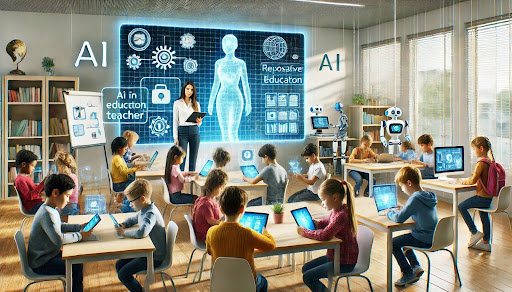In recent years, education in Oman has seen a remarkable transformation. Schools across the country are adopting cutting-edge technologies, and artificial intelligence (AI) is at the forefront of this revolution. By integrating AI into classrooms, Omani schools are making learning more personalized, engaging, and effective for students of all ages. This shift is not just about technology; it’s about creating an environment where every student can thrive according to their unique abilities and interests.
AI Tailoring Education to Individual Needs
One of the most exciting aspects of AI in Omani schools is its ability to create personalized learning paths. Traditional education often follows a one-size-fits-all model, which can leave some students struggling and others unchallenged. AI changes this by analyzing student performance, identifying strengths and weaknesses, and designing customized lesson plans.
For example, a student who excels in mathematics but struggles with reading comprehension can receive more advanced math exercises while being provided with tailored reading support. This individualized approach ensures that each student progresses at their own pace, reducing frustration and increasing motivation.
AI systems can also track patterns over time, offering teachers insights into how students learn best. This allows educators to adapt their teaching strategies to meet the unique needs of each class, making lessons more dynamic and effective.
Enhancing Engagement Through Interactive Tools
Another major benefit of AI in Omani schools is the use of interactive learning tools. AI-powered platforms often include gamified lessons, virtual tutors, and adaptive quizzes that respond to a student’s performance in real-time.
These tools make learning more enjoyable and engaging, which is essential for maintaining student interest. When students are excited about what they are learning, they are more likely to retain information and participate actively in class. For younger learners, AI can turn subjects like science and math into immersive experiences, helping them understand complex concepts through interactive simulations and visual storytelling.

Supporting Teachers and Reducing Workload
AI is not just for students it is a powerful ally for teachers as well. Educators in Omani schools are finding that AI can handle time-consuming administrative tasks, such as grading assignments, tracking attendance, and analyzing performance data.
This automation frees up teachers to focus on what matters most: teaching and mentoring their students. Instead of spending hours on repetitive tasks, teachers can dedicate more energy to creating meaningful lessons, providing feedback, and supporting students who need extra help.
Additionally, AI offers professional development opportunities by suggesting teaching strategies based on classroom data. It helps teachers understand which methods are most effective for their students, empowering them to continuously improve their approach.
Encouraging Lifelong Learning and Critical Thinking
Personalized learning through AI is not just about academic achievement it also fosters lifelong learning and critical thinking skills. By allowing students to explore subjects at their own pace and follow their interests, AI encourages curiosity and independent thinking.
Students learn how to analyze information, solve problems creatively, and make decisions based on data. These skills are invaluable in today’s rapidly changing world, where adaptability and critical thinking are essential for success.
Omani schools are also using AI to introduce students to emerging fields like coding, robotics, and data analysis. This early exposure equips students with the knowledge and skills they will need for future careers in a technology-driven world.

Bridging Educational Gaps
AI has a powerful role in promoting equity in education. In Oman, schools face challenges such as varying levels of access to resources and differences in student learning abilities. AI can help bridge these gaps by offering personalized support to students who may otherwise fall behind.
For example, students in remote areas or smaller schools can access the same quality of education as those in larger, urban schools. AI-driven platforms provide learning materials, tutoring, and assessments that adapt to each student’s level, ensuring that no one is left behind.
This democratization of education is transforming how students in Oman perceive learning. It fosters confidence, improves outcomes, and opens doors for every child to succeed regardless of their background.
Preparing Students for a Digital Future
As Oman continues to invest in technology and innovation, equipping students with digital skills is a top priority. AI in schools is not just a teaching tool it is a way to prepare students for a future where technology plays a central role in nearly every industry.
Students learn to interact with AI responsibly, understand its potential, and explore how it can be applied in real-world scenarios. This early familiarity with AI technology gives Omani students a competitive edge and inspires them to pursue careers in science, technology, engineering, and mathematics (STEM).
The Road Ahead for AI in Omani Education
The integration of AI in Omani schools is still evolving, but its impact is undeniable. Schools are continuously exploring new ways to enhance learning experiences, making education more personalized, inclusive, and effective.
As AI becomes more sophisticated, it is likely to offer even more innovative solutions, such as predicting future learning needs, creating collaborative learning environments, and providing instant feedback on complex tasks. The possibilities are endless, and Omani students are at the forefront of this educational revolution.
By embracing AI, Oman is not only improving academic outcomes but also nurturing confident, adaptable, and skilled learners who are ready to thrive in a fast-changing world. The journey has just begun, and the future of education in Oman looks brighter than ever.
Do follow Gulf Magazine on Instagram.
Also Read – Impact of Mobile Learning on Student Engagement in Oman: Boosting Motivation and Performance



